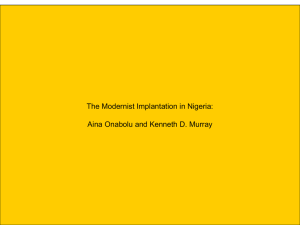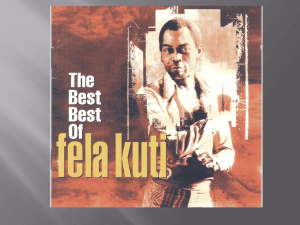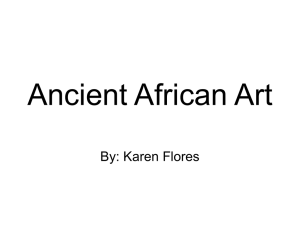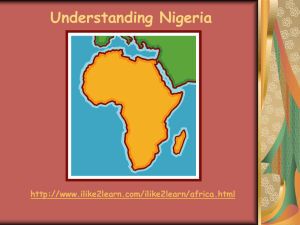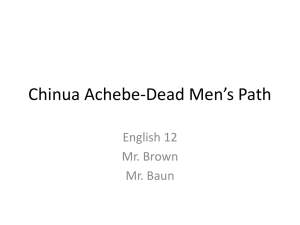Sculptures of Ancient Nigeria : Nok, Igbo Ukwu, Ife & Benin
advertisement
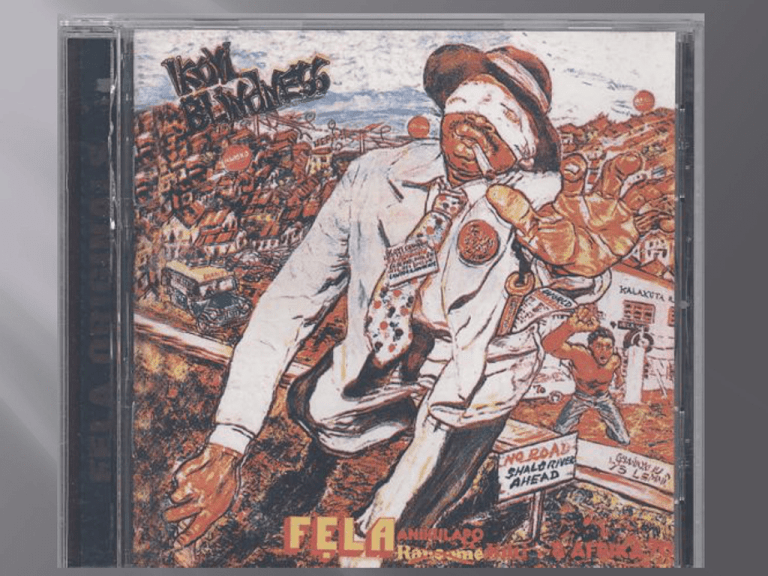
Sculptures of Ancient Nigeria: Nok, Igbo Ukwu, Ife, Benin (Edo-Bini) 2500 BP (500 BC) –1897 AD Map of Nigeria depicting the ancient culture areas Conceptual basis of African Art Visual Metaphors Emotional & Social Proportions Head—site of spirituality and personality Nok: the birth of Art in Africa Oldest sculpture in Africa south of the Sahara Dates back 2500 BP—500 BCE Located on the plateau In North central Nigeria Characteristics: - Fairly naturalistic life size cylindrical heads and figures -Semi circular/triangular eyes -Flared nostrils -Pierced eyes, nose, mouth and ears -Elaborate coiffure The Dinya Head Nok, Nigeria c. 500 BC – AD 200 ( 2500 – 1800 BP ) Terracotta 36 x 22.5 cm Warrior Figure Nok, Nigeria Terracotta 88 x 23 x 20 cm Head of a Bearded Man, Nok (Sokoto) Terracotta, 2300BP Amulet statuette, Nok, Nigeria Terracotta, 2350 BP, h. 5.5 in Kneeling male figure, Nok, Nigeria Terracotta 65.5 x 19 x 23 cm Based on style elements object might have Functioned as finials on rooftops Human/Bird Composite Birdman, Nok, Nigeria Terracotta 47 x 20 x 22 cm Statue on bended knee with Elephant and Feline, Nok, Terracotta, 2350 BP Igbo Ukwu: Art of an ancient Aristocracy Igbo Ukwu art comes from 3 Archaeological sites in southeastern Nigeria: Igbo Richard, Igbo Isaiah and Igbo Jonah -consists of objects made from bronze, terracotta, beads and Ivory -metal objects were made by the lost wax technique -they are believed to date to around 1100 BP(900 AD) -objects discovered in ancient burial chambers, shrines and storage areas -made by sophisticated bronze casting techniques Objects include bronze pendants, bowls, and shells With skeuomorphic ornamentations Caroline Sasson’s rendering of the burial chamber of Igbo Richard, Depicting the priest-king, Igbo Ukwu, Water color, Artistic rendering of the storage house From Igbo Isaiah, depicting some of the sacred objects on an altar Roped Vessel on a stand, Igbo Ukwu, Leaded bronze, 1100 BP (900AD) Staff finial or flywhisk handle With an equestrian motif, Igbo Ukwu, Nigeria 9th century (1100 BP) Bronze h. 15.7 cm (6 3/16 in.) Emotional/social proportion Head Pendant Igbo Ukwu, Nigeria 9th Century (1100 BP) Bronze h. 7.6 cm Keloid like patterns on the face are marks of distinction and identity Triton shell, Igbo Ukwu, Nigeria, Bronze, 1100 BP Skeuomorphic image of a snail shell Globular ceramic vessel with everted rim, Igbo Ukwu, Nigeria 9th Century (1100 BP), Terracotta, h. 40.6 cm Ife: origin of Art and Life Ife: Origins of Art and Civilization Art consists of objects in Terracotta, Leaded Brass, & Stone --objects date to 1000-500 BP (1000-1500AD) -art created for the ruling elite Style elements: Idealized naturalism Striation on the face Slightly elongated necks, with rolls of fat Careful modeling Heavily beaded figures with elaborate headdresses Full length figures and busts Group of stylized abstract heads representing, inner spiritual head--site of personality Yoruba, (Ita Yemoo, Ife) Nigeria, terracotta, h. 13 cm(5 in); 19 cm(7.1/2 in); 16.5 cm (61/2 in) 16 cm (6 3/8 in) Ooni (Ruler), Yoruba, (Ita Yemoo, Ife) Nigeria 12th -13th century (800-700 BP) Zinc brass (leaded brass) 47.1 x 17.3 x 16.3 cm Appro. h. 18 3/8 in Idealized naturalism Emotional proportion Lajuwa, royal usurper Terra-cotta, Ife, Yoruba, 12/15th cent. (odo) Ephebism: relative youthfulness Head, Yoruba (Ife), Nigeria 12th-15th century (700-500 BP) Zinc brass (leaded brass) 31 x 9.5 cm Mask Head Yoruba (Ife) Nigeria 12th-15th century (700-500 BP) Copper, 33 x 19 cm (13 in) Seated figure, Yoruba, (Tada) Nigeria 13th-14th Century (700-600 BP), Copper 55. 7 x 34.4 x 36 cm h. 21 9/10 in. Ceremonial vessel with female form Ife (Yoruba) Nigeria Leaded brass 900-800 BP (11th/12th Century) Crowned Head of a Ruler, Ife, Nigeria Zinc Brass, 800-500 BP (12th-15th cent.) Leo Frobenius assumed this was Greek Poseidon or Roman Neptune Which belonged to the famed Atlantis Benin: foundation, zenith and demise 1450-1897 Oranmiyan, Eweka Dynasty The Royal Art of Benin Found in southwestern Nigeria -Objects consist of commemorative busts and ritual items for members of the royal family Vast majority of art made in bronze, terracotta, and ivory Early Period (Warrior Kings 1450-1575 i.e 600-400 B.P ) Middle Period (Plaque Period, 1575-1700 i.e 400-300 B.P ) Late Period (Restoration Period 1700-1897 i.e 300-100 B.P ) Style Elements Thin castings, Busts depict beaded collars Delicately rendered features Careful attention to details, in terms of surface ornamentation Bust of Kings and Queen-mothers Plaques, animal imagery etc Head of Oba, Benin, Nigeria, Brass and iron, early period, (500-400 BP) 8.25 in. (21 cm) Head of an Oba, Late Period, Bronze, 18 in. Head of a Queen Mother, Benin, Nigeria 16th century (400 BP) Brass h. 35 cm Warrior Chiefs, Bronze Plaque, 400-300 B.P, 18.7/8 in Plaque of warrior chiefs, Benin, Nigeria, 16th century (400 BP), brass 50 x 37 cm Social proportion--hierarchy Portuguese Soldier, Plaque Period, Bronze Palace Messenger, Bronze, Benin, Nigeria Late period Leopards, Bronze, Benin, Nigeria, late period Evoking the metaphoric powers of the ruler Stool with mudfish motif, bronze, Benin, Nigeria, Late Period Metaphor of transformation, survival and continuity British Marines displaying their loot after the sack of Benin, 1897 Mask, Ivory, 16th century Benin Festac 77
